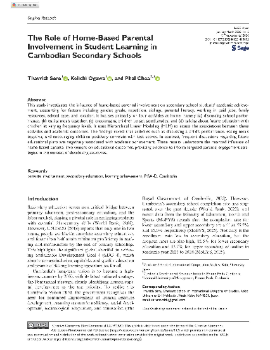
The Role of Home-Based Parental Involvement in Student Learning in Cambodian Secondary Schools
This study investigates the influence of home-based parental involvement on secondary school students’ academic achievement, accounting for factors including gender, grade, repetition, siblings, parental literacy, working in paid jobs, family resources, school type, and location. It focuses primarily on four activities at home, namely (a) discussin...
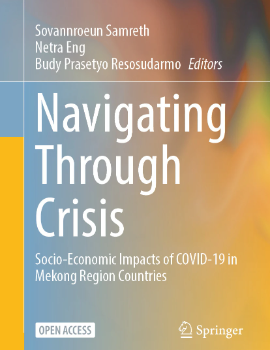
COVID-19 and Countries in the Mekong Region
This chapter provides an overview of the COVID-19 pandemic, its socio-economic impacts, and policy responses in Cambodia, Lao PDR, Myanmar, and Vietnam (collectively referred to as CLMV). It presents how the pandemic affected key sectors and heightened existing vulnerabilities, particularly among women, migrant workers, and those in the informal se...
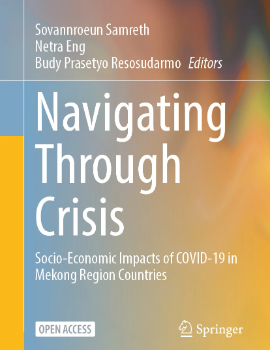
Lessons from the COVID-19 Pandemic in the Mekong Region
The experiences of Cambodia, Lao PDR, Myanmar, and Vietnam offer several lessons for the pandemic’s responses. First, economic diversification and innovation improved resilience to the shocks. Second, timely public health actions lessened the pandemic’s adverse effects. Third, the pandemic revealed social protection gaps, especially for migrant and...
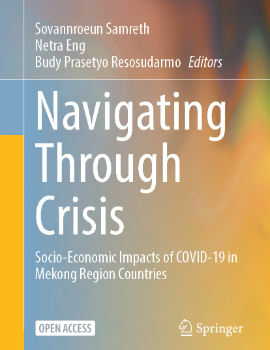
Assessing the Impact of COVID-19 on Cambodia’s Trade, Global Value Chain, and Export Competitiveness
The COVID-19 pandemic has severely disrupted global economic activity, impacting Cambodia’s trade dynamics, weakening its integration into global value chains, and undermining export competitiveness. This chapter assesses the pandemic’s effect on Cambodia’s trade landscape, focusing on shifts in export structure, supply chain disruptions, and chang...
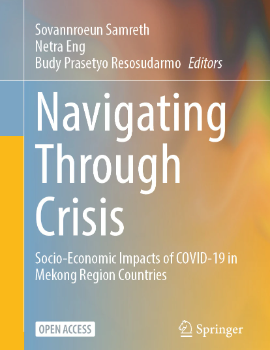
Cambodian Cassava and COVID-19: An Analysis of Production, Productivity, and Gender Impacts
Although the agriculture sector in Cambodia was initially considered less vulnerable to the COVID-19 pandemic, cassava farmers experienced severe economic hardship due to the increase in input prices, fluctuations in output prices, and challenges in infrastructure development. However, these aggregate impacts hide the disproportionate repercussions...
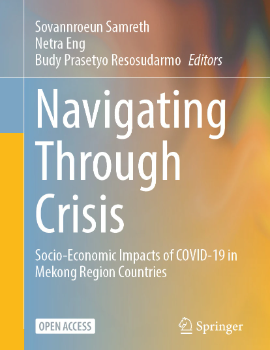
Navigating Crisis: Firm Performance and Strategic Responses in Cambodia
The COVID-19 pandemic significantly impacted Cambodia’s economy, leading to a contraction of -3.1% in 2020, with sharp declines in the service and industry sectors. Cambodian businesses, particularly small and medium enterprises, faced considerable turmoil while already grappling with challenges. This study examined firm performance—including expen...
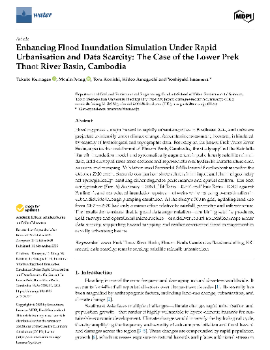
Enhancing Flood Inundation Simulation Under Rapid Urbanisation and Data Scarcity: The Case of the Lower Prek Thnot River Basin, Cambodia
Flooding poses a major hazard to rapidly urbanising cities in Southeast Asia, and risks are projected to intensify under climate change. Accurate risk assessment, however, is hindered by scarcity of hydrological and topographic data. Focusing on the Lower Prek Thnot River Basin, a peri-urban catchment of Phnom Penh, Cambodia, the study applied...
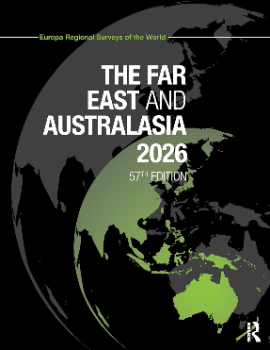
Aid and Development in South-East Asia
Southeast Asia exhibits varied developmental progress, meaning Official Development Finance (ODF) remains essential for closing key infrastructure and development gaps.The focus of development aid has evolved from its historical geopolitical origins to a modern emphasis on poverty reduction, governance, and inclusive economic growth.Today's develop...
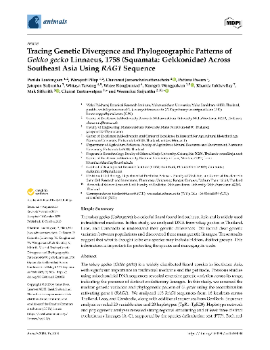
Tracing Genetic Divergence and Phylogeographic Patterns of Gekko gecko Linnaeus, 1758 (Squamata: Gekkonidae) Across Southeast Asia Using RAG1 Sequence
The tokay gecko (Gekko gecko) is a widely distributed lizard species in Southeast Asia, with significant importance in traditional medicine and the pet trade. Previous studies using mitochondrial DNA sequences revealed extensive genetic variation across its range, indicating the presence of distinct evolutionary lineages. In this study, we asse...
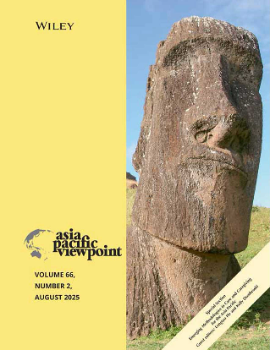
From Loss to Transformation? Towards Pluralistic and Politicised Agrarian-Climate Futures
Understanding how actors perceive and anticipate future states of the world is gaining traction in climate change governance scholarship and related calls for sustainability transformations. However, smallholder farmers, indigenous groups, and local communities, who are expected to bear disproportionate burdens of loss and damage from climate c...
